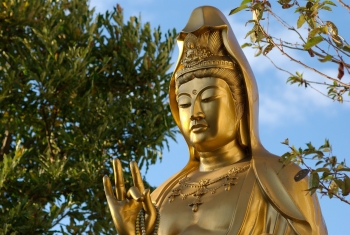On more than one occasion at Guang Jue Temple I have been asked by retreat guests the question, or perhaps comment disguised as a question, “Surely you don’t really believe that!”. The question is most often asked in response to some doctrinal point or practice in Pure Land Buddhism but could have equally been asked in response to any aspect from any school of Buddhism.
I am very often intrigued by the question as I wonder what answer the inquirer is expecting. “No, of course, I don’t believe that. I am really just kidding.” Or, “No, I don’t believe that because all that the Buddha taught is far too hard to believe, I just spend my time pretending to believe!” Perhaps it is because the inquirer is struggling with that particular aspect of the teaching that he/she would feel more comfortable if she didn’t have to make such an enormous leap of faith into what could seem as strange unknown territory. Perhaps it is because they are struggling to put me into the box which has been their comfort zone for so long. After all, what is this Buddhism stuff? I thought it was about quiet and relaxing meditation and now I am being told to believe in a thing called Karma and other things with unfamiliar sounding names from a language which is not my own or believe in a Buddha I have never heard of. All too hard! Of course, I would feel that if I believed in these things I would be struggling to make sense of it all and how I fit in.
Buddhism is the teaching of the Buddha. Now I learn there are more Buddhas. And this Amitabha Buddha? I am not even sure he really lived. But then again, I am not even sure what “really” means any more. Such are the struggles that many have in meeting the Pure Land School or Jing Tu Zong as it is termed in Chinese Pure Land Buddhism, one of the largest schools of Buddhism in China.
It seems that it is a big leap in faith to get one’s head around Pure Land concepts or indeed many concepts in Buddhism. It is not surprising then that even many of Buddha’s own disciples found it difficult to believe many of his words. The Pure Land method is concerned with many transcendental realms beyond human knowledge or wisdom. This is why it is very difficult for us to readily understand such realities. The fault lies with the practitioner, not the method. Faith is the operative word. It is indeed a major foundation on which Pure Land Buddhism is built. The tripod on which Pure Land stands includes faith, vows and practice. The three are really a unity.
For many exploring Buddhism the word “faith” has a familiar ring to it being used in other religions. However, the concept of faith in Buddhism is quite different to other religions. In Buddhism, faith never means blind faith. In Buddhism, faith is a faith that evolves from wisdom, rigorous testing and practice. When I was a young boy I was a late starter in learning to ride a bicycle. I recall my younger sister saying: “you think you can really ride that thing?” I was not quite sure but I had seen my friends ride their bicycles so I guessed I could do it. At first it was hard and I needed the steady hand of my father to hold the bicycle for me so that I could get a sense of balance. Eventually he would let go. Many falls and scrapes later I was able to ride and as I got my balance I became more and more confident. This is very much like our beginning days in Buddhism. As we put it to the test we soon see the results and the results in turn increase our faith and motivation.















